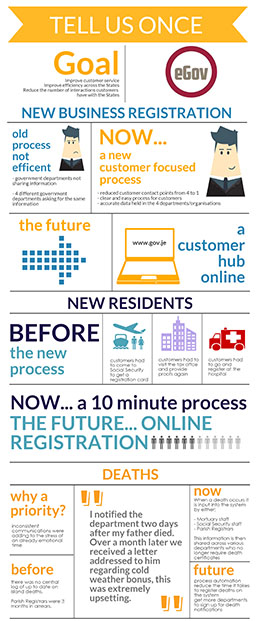 In Part 1 of this blog I explained the approach we are using to deliver the Tell Us Once (TUO) programme. In this second part I’ll review what we’ve delivered so far.
In Part 1 of this blog I explained the approach we are using to deliver the Tell Us Once (TUO) programme. In this second part I’ll review what we’ve delivered so far.
Like the eGovernment programme itself, TUO is expanding both in terms of scope and team size. We aim to do more and at a faster pace and are continually learning from what has worked, what hasn’t and identifying areas that could still be improved.
Registering as a new resident
Since April, an improved way of registering new residents in Jersey has been in place. Previously new residents were required to contact various departments, but now a visit to Social Security with photo ID is all that is required.
There are no forms to fill in, just a few questions and the customer leaves with a registration card and Social Security number.
The customer’s information is then passed on to the Taxes Offices (so their tax rate can be assessed) and to the hospital, so if they are ever referred to a consultant or A&E they’ll already be known.
All the information about what new residents need to do and what happens to their data can be found on gov.je.
So far we have saved more than 3,000 people a trip to the Taxes Office, waiting times and the inconvenience of repeating the same information to several departments. We have also improved the quality of data we hold.
However as we still rely on manual processing it is far from efficient, and improving this element of the project will be addressed in the next phase.
Registering new businesses (sole trader or partnership)
Since May, people wanting to start a new business as a sole trader or partnership have had a much better experience (not my words, this is what we were told by businesses that went through the process before and after the changes).
The Business Licencing Team (previously the Population Office) and the Contributions team in Social Security, the Taxes Office and the Jersey Financial Services Commission worked together to develop a single process to:
- request a licence to trade
- register a business name
- inform self-employed status for Tax and SSD
- register (if required) as an employer (ITIS and SSD)
The process has proved to be easy, smooth and quick for the more than 500 businesses that have benefited from it so far.
We haven’t yet managed to get rid of paper entirely, nor can limited companies use the new process, so the focus for the next phase is clear.
Notification of a death
One of the most surprising facts we learned when prioritising candidate processes for the TUO programme was that no one in the island had a complete electronic record of deaths. As a consequence many departments and organisations spent a lot of effort and resource trying to maintain their own.
Since July, through the combined effort of the Mortuary, GPs, Funeral Directors, Social Security, the St Helier Registrars and the Office of the Superintendent Registrar, all on-island deaths (about 160) have been captured in a database. Furthermore this information is now available to departments that need immediate notification. An additional 90 deaths that occurred off island have also been recorded.
On average, on-island deaths are recorded within 2 days (with notification available at midnight). We hope to reduce this time further so that we can stop or alter service and communications with the deceased at the earliest opportunity. We also need to make sure that the information gets to everyone that may need it.
We rely on other parties to notify us of an off-island death, which can take seven days on average and up to a maximum of 21. This is largely out of our control but we are using the same process to distribute the information, once we receive it, as quickly as possible.
Since September the St Helier registrars have been contributing information to the death registration database. This is for the first time allowing Jersey to have an electronic copy of one of the 12 death registers held by the parishes. Having the register in an electronic format also opens up a number of opportunities to improve what still is a strictly manual (including handwriting of records, certificates and copies) process.
Registration of births
Finally, on a happier note, since 16 September we have saved the parents of the almost 300 children born in Jersey the trip to register their child at Social Security.
We have also ensured, as soon as the names of the child and its parents are confirmed with the parish registrars (St Helier in over 95% of cases) that records are updated by the relevant areas at the earliest opportunity.
Much has been achieved in 2015 and I look forward to updating you on the progress of the next phase of TUO. Best wishes for 2016!
 blog.gov.je
blog.gov.je